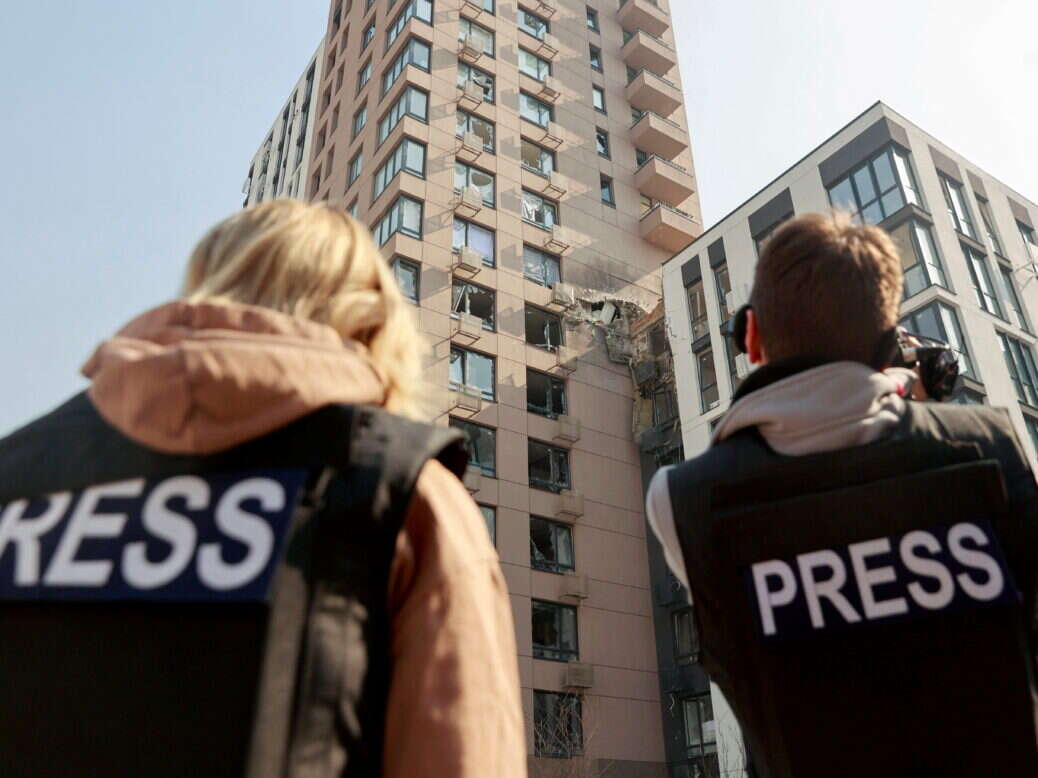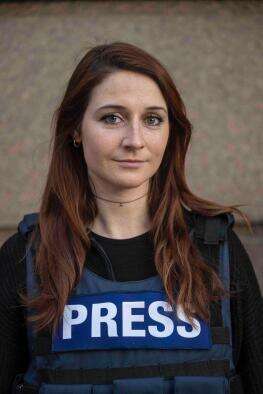
Hundreds of foreign correspondents have been reporting on the war in Ukraine at any one time, including dozens from the UK.
Many have never been on the frontline before, whether because of their age or because they have moved from less dangerous beats to meet huge audience demand for trusted news from Ukraine.
Press Gazette spoke to Telegraph political and defence correspondent Danielle Sheridan, i economics editor David Parsley and Mail Online reporter Nick Craven about how they have found tackling frontline war reporting for the first time.
They shared tales of yellow backpacks creating targets on backs, trying to counter rumours that sprung up almost constantly, and witnessing even experienced correspondents having panic attacks.
For 32-year-old Sheridan, there are many images from her time reporting from Ukraine, including the town of Bucha where a large number of civilians have been killed by Russian forces, that will be impossible to forget. She plans to “figure out” how to process it later on.
It is her first conflict zone, although she likened the collapsed buildings to seeing rubble from Syria and Aleppo on TV.
‘I basically had a target on my back’
She found that reporting on a war for the first time was simultaneously familiar and completely alien to the reporting she had done before.
“I didn’t really know how the hell it worked,” she explained. “And I had colleagues that were really generous with their time like Ben Farmer, Roland Oliphant and James Rothwell, who had all been here before I came out, who all took the time to have a phone call with me about what to expect and how to approach it.”
Sheridan added that even then, “knowing what was actually appropriate” still proved to be challenging. She told a story of her interaction with an ex-marine who helped her get into Bucha.

Picture: Danielle Sheridan, The Telegraph
“I’m wearing this yellow backpack and he just looked at me and went: ‘you’ve come to a warzone and you’re wearing a yellow backpack’. I basically had a target on my back,” she said.
“But in some ways, it’s also not so different from how you would approach a door knock in the UK. I mean, you’ve got to find people, locals who can talk to you and explain what’s happened.
“And then it’s only through having those dialogues that someone might alert you to something else that’s happened, which is exactly how we found a mass grave in a woman’s back garden.”
[Read more: Telegraph’s Danielle Sheridan on witnessing Bucha’s mass graves and dealing with the aftermath of tragedy]
‘I don’t think it should just be the domain of the battle-hardened veteran’
“I’m not entirely a war newcomer, but I certainly wouldn’t put myself in the same class as the sort of Jeremy Bowens of this world,” said Craven, who arrived in Ukraine to report for Mail Online almost a month before the actual invasion began. “I don’t think it should just be the domain of the battle-hardened veteran.”
Of the period before the invasion began on 24 February, Craven added: “We thought something would happen, probably in the Donbas certainly. But the idea of Putin attacking Kyiv just did seem unthinkable… And it really took everyone by surprise the day it happened.”
Once the war began, there were plenty of complications. Craven said his hostile environment training did not fully cover how to use a satellite phone, meaning he found himself looking up how to use one on Youtube.
He also noted that providers of body armour and helmets for journalists were already running out in London when he left for Ukraine in late January.
Freelance journalism charity The Rory Peck Trust previously told Press Gazette it had been struggling to source the right protection for journalists.
The effects of working in a war zone for a prolonged period has an impact on reporters, Craven said. “It certainly does concentrate your mind when you get woken up by a bang that rattles the windows. You started to jump at all sorts of silly bangs.
“Even in Lviv, you’d hear somebody move a bit of furniture in a hotel room above. And it just sounded like some kind of explosion from a distance and suddenly you start to get a bit jumpy.”
On the 27-hour journey out of Kyiv to Lviv, a vehicle his group was travelling in broke down at 3am on an empty road as the sound of automatic gunfire echoed in the distance.

Picture: Nick Craven
“One of the people on that convoy was fairly experienced but had a bit of a panic attack… and started abusing the security people,” he said. “It just showed me that however experienced you are, it doesn’t matter really.”
Craven said he felt that TV companies tended to have more constant back-up and infrastructure than newspapers in foreign conflict zones: “If we had that, I think I might have stayed longer in Kyiv,” he said.
‘If you were willing to go, you went’
Parsley had spent his career covering business and economics, most recently as economics editor at the i, before asking his editor if he could report from Ukraine.
“I would never count myself as someone who was on the frontline because I wasn’t. I was in a hotel in Kyiv,” he said. “There were lots and lots of rumours. So when you’re talking about challenges, you’d hear a different rumour every two minutes… So I would try to speak to as many Ukrainian people as I could.”
There are a few reasons why this conflict has led to more first-time war reporting. For starters, the war in Ukraine has been labelled the biggest conflict in Europe since the Second World War and millions of people across the world are watching to see what happens next.

David Parsley, i economics editor
“Every newspaper and every media organisation is there… Whether you were an experienced war reporter or not, if you were willing to go, you went,” said Parsley. “It’s the biggest story to happen in 80 years in Europe. And because it involves Russia, it’s incredibly important to make sure as much of the truth gets out as possible.”
He added: “It’s about making sure, whoever is reporting, that you’re not just getting a second-hand view. You want to make sure your readers or your viewers or listeners are getting a first-hand account of what’s actually going on.”
‘There are two stories of this war’
The size of the Ukraine conflict has produced a variety of stories for outlets to cover, from frontline battles and life in artillery-barraged cities to a refugee crisis.
Both Parsley and Craven said their decisions to leave Kyiv to report instead from Lviv and the Ukrainian border were motivated not by a desire to escape but to report where their contributions would be most valuable.
“There are two stories of this war, there are people that are facing absolute devastation and misery in places like Mariupol or Kharkiv and the story of the people who have had to leave these places,” said Parsley.
“I was one of those war newcomers. And I thought my skills were much better implemented talking to people I could actually talk to rather than sitting in a car park basement three floors underground in Kyiv.”
The shift to digital also meant that news titles are no longer limited by the amount of space for coverage they have in their print editions.
“Something like Mail Online has massive unlimited capacity in a sense, just to cover all that stuff at once,” said Craven. “That’s one of the beauties of the place compared to a just print newspaper, where all your stuff is always cut, cut, cut. At Mail Online, they’ll run it.”
Picture: Reuters / Serhii Nuzhnenko
Email pged@pressgazette.co.uk to point out mistakes, provide story tips or send in a letter for publication on our "Letters Page" blog
